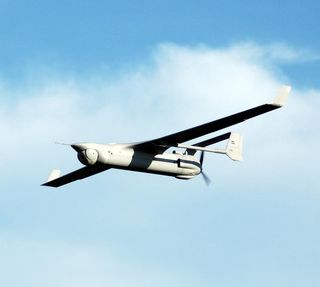Marine Corps Testing New 'Blackjack' Surveillance Drone

The U.S. Marine Corps is testing a new surveillance drone that can fly for up to 16 hours, and reach targets 100 miles (160 kilometers) away.
The 135-pound (61 kilograms) RQ-21A drone, nicknamed Blackjack, is designed to take off from land or from the deck of naval assault ships. The unmanned vehicle is expected to enter operational service by next year, reported Military.com.
The Marine Corps eventually plans to operate 160 Blackjack drones to gather reconnaissance and conduct surveillance. The vehicles can be equipped with video cameras, infrared sensors, laser finders and other communications equipment, according to Military.com.
The drone is currently being tested at Yuma Proving Ground, a sprawling U.S. Army installation in southwestern Arizona. Marine Corps officials are experimenting with ways for unmanned and manned vehicles to work together. In one of the trials, marines flying in the back of a military helicopter were able to maneuver the Blackjack drone using a tablet-type device, said Maj. Wayne Phelps, requirements officer for the aviation branch at the Marine Corps headquarters.
"They were able to slew the camera to see different points and control the sensor," Phelps told Military.com. [7 Technologies That Transformed Warfare]
He added that the drones will be outfitted with instruments that use electromagnetic signals to sense the terrain below, which means the planes will be able to beam back information about a target location regardless of cloud or weather conditions.
The RQ-21A drones could also be used to relay communications between parts of an existing network, Phelps said. For example, the unmanned planes could function as an airborne hub to link more effectively amphibious vessels with facilities on the ground.
Sign up for the Live Science daily newsletter now
Get the world’s most fascinating discoveries delivered straight to your inbox.
The Marine Corps is actively expanding its use of drones, which is consistent with broader strategies being pursued by other branches of the military. The RQ-21A Blackjacks are set to join the Marines' growing arsenal of unmanned vehicles, which currently includes a range of medium-size and handheld drone systems.
The Marines are also testing technology for a separate, new drone system that can be used to carry out electronic warfare, reported Military.com. The new vehicles are early in the development stage, but will likely feature improved capabilities.
"We're still defining what the requirements are for the Marine Corps for this," Phelps told Military.com. "We've been experimenting through tactical demonstrations with our weapons and tactics instructor course on some of the capabilities we think need to be resident at the tactical edge of unmanned aircraft systems."
Follow Denise Chow on Twitter @denisechow. Follow LiveScience @livescience, Facebook & Google+. Original article on LiveScience.

Denise Chow was the assistant managing editor at Live Science before moving to NBC News as a science reporter, where she focuses on general science and climate change. Before joining the Live Science team in 2013, she spent two years as a staff writer for Space.com, writing about rocket launches and covering NASA's final three space shuttle missions. A Canadian transplant, Denise has a bachelor's degree from the University of Toronto, and a master's degree in journalism from New York University.
Most Popular


